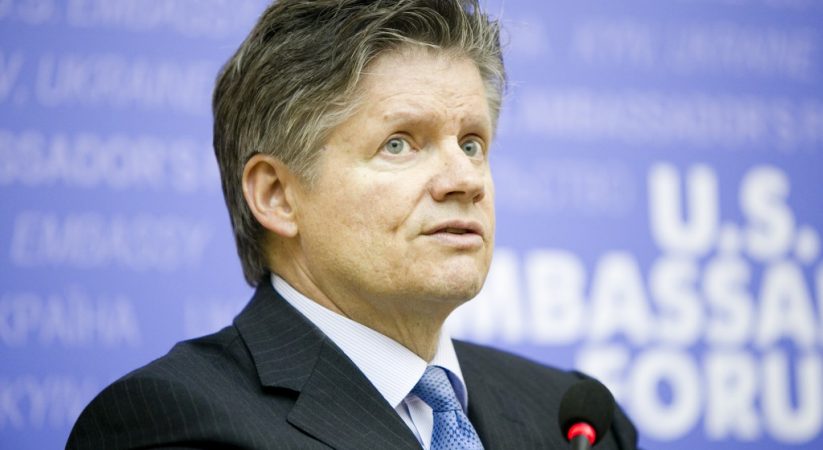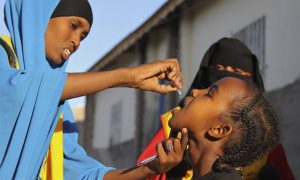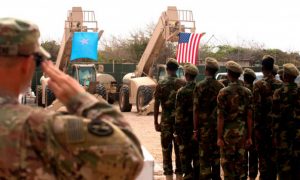
Premium Times | | Nicholas Ibekwe – Minnesota has arguably the largest Somali community outside East Africa. There are more than 25,000 people of Somali origin living in the twin cities of St. Paul and Minneapolis. Regrettably, this congregation of Somalis has become a fertile recruitment ground for terrorist groups like Al Shabab and the Islamic State who are luring disgruntled youth from the state to become terrorists.
The following is an excerpt of a discussion between John Tunheim, the Chief Judge of the United States federal court for the district of Minnesota, with 2016 class of the World Press Institute (WPI) fellowship on what the United States authorities are doing to counter the recruitment drive of these militant groups.
Nicholas Ibekwe, a PREMIUM TIMES journalist, is a 2016 fellow of the WPI.
Question: How is the justice system in the state handling cases of terrorism particularly among the Somali community where youth are being recruited by the Islamic State and other Islamist groups like Al-Shabab? I ask this because there are complaints of ethnic profiling among the Muslim community in the Twin Cities authorities.
Judge Tunheim: There is actually a lot going on right now to try to tether the recruitment efforts. The recruitment efforts are very sophisticated. I have watched the videos; they are pretty good. Just by way of background, the first cases we had here are people who had been to Al Qaeda training camps. Those were the cases that I had. And then we had a small group of young men that were disappearing and they were going there, in some cases for the first time since they were two or three years old and fighting for Al-Shabab. The first one was in 2003; individuals who were led to train in what was Bin Ladin’s camps probably in Pakistan. Then the next wave was young men disappearing and who were recruiting or fighting for Al-Shabab, which is a terrorist organisation in Somalia. Many of them were killed. The next cases were people in the Somalia community (who) where sending money over there to support Al Shabab. Giving aid or material support to terrorist organisations, which is a federal crime in the United States.
They claim they were just sending it to charity organisations who were supporting people with food, clothing and blankets and that sort of things; and then the proof in the case was these charities were fronts for Al Shabab. There were two women, older women, who were convicted. And then the next groups are people who already left; there were people who were caught. There are nine cases we are attending to now – individuals who were caught on their way over to Syria. The FBI has worked hard in the community and infiltrated some of these groups and the individuals were arrested either at the JFK Airport and in one case at a warehouse in the Mexican border on their way to Syria
I believe the FBI are working in the community right now to try and prevent more people from going. They are working up active cases. Probably they would have more cases here.
Question: Apart from prosecuting and jailing potential recruits what is the justice system doing to help prevent potential recruits from the community.
Judge Tunheim: What is being done to stop this? Working with the families is the best case thing. I think a lot of the families in the Somali community were in disbelief. They thought the FBI was putting a lot of people up to this and were framing people. We had a trial and three of the defendants were convicted and when the evidence came out, the trials were really eye-opening for members of the community. The FBI is now getting more co-operation to try and stop people from being enticed by this very sophisticated videos. It is like a New York public relation firm writing these videos. It is just incredible. They are very, very good. They use people who are from here who are over there now talking in the videos of what a paradise it is and how wonderful everything they are doing. It sounds like a vacation. Obviously we know it’s not. Our probation office has been working closely with a person from Germany who is a de-radicalisation expert so we know how to handle these people when they get out of prison, how to supervise them to ensure they are not radicalised anymore. There are several community organisations who are working closely within the community. The community is doing a pretty good job in identifying people who might be subject to this and kind of stopping it before they get too excited and go over to ISIS.
It is a difficult task. Public Broadcasting Service (PBS) locally is doing programmes about the terrorist cases in the last 15 years. They were here last week. I was interviewed. 60 Minutes is doing a programme on how we are trying to reach out to and the thing prosecutors are doing. It’s new territory for us. We have dealt with radical groups in this country forever but this is a little bit different. This is difficult to figure out exactly.
Generally speaking, of the Somali community in this country I think is doing well. It is a large group. They are about to elect the first person from that group to the legislature this fall. They are becoming much more active politically in the community. And we have a lot of African-immigrant community in the Twin Cities as well. They are not all that different from immigrant communities of the past. My ancestors about a hundred years ago were part of that community.
We haven’t had any terrorist event locally. This is all about keeping people from going over there and fighting and losing their lives or coming back here as radicals which is big concern to us.
Question: How many have gone over there to fight?
Judge Tunheim: It’s hard to tell. No one has a really accurate number but there are probably at least 50 to 60 who have left Minneapolis and gone over to Somalia or either Syria or either Iraq in the last decade. People go back and fought. People grew up there and want to go back. In fact, part of the government there are people who lived in the United States, but the radical part of it has been in recent years. Most of them don’t come back. I don’t know if they have any documented cases of anyone coming back. But we have document cases of people who left and were killed. I think they are 14 now that perished in one of those duplexes. Two of them are missing and presumed dead trying to figure that out is difficult.
Question:You mention de-radicalisation as part of the probation process. Do you have concerns that some of them are being radicalised in prison?
Judge Tunheim: It is a huge problem. Our Bureau of Prisons, which runs our federal prisons, has no de-radicalisation programme whatsoever. They are often behind the times. I hope what we’re starting here in our work on helping to analyse these people, what they need, what they don’t need, and bringing mentors and counsellors to work with them, we are talking to the Bureau of Prisons, no doubt. We are hitting some communication with them. If you put someone in prison for 20 years and they are worst when they come out and they have radicalised other people around them; that is the problem for a prison service which doesn’t pay any attention yet to this. They probably send most of them initially to Florence, the maximum security prison.
There have been some who have been arrested and charged on the basis of their communication with people over there. But they have made no move to leave because they are being watched. And the question has been whether they are going to leave or not; and if they leave they would be intercepted by the FBI on their way but most of them have been charged now.
Question: I would like us to talk about an issue that is particularly important to African countries. I have read that government has placed a ban on the Somali community from remitting money back home. What do you think of this ban which has effectively stopped people from sending life-saving funds back home?
Judge Tunheim: Shutting down the banking organisation that help to send money back home, I think that was really problematic. The vast majority of Somali people back home, it helped them live. That has been done by immigrants for centuries. My own ancestors probably sent money back home. It’s not unusual. And you got to find a way to do it. It’s not easy but you got to find a way to do it. I think it was problematic, this shutdown especially a shutdown of a method of sending money without really a replacement for it. I’m not sure why we can’t get the best minds together and figure a way of doing it; a way where you can’t get some money going to the wrong places. I’m in agreement that it was a bad idea to shut it all down. Because I know particularly in the African communities in this country there is a lot of money that is sent back home and for good causes.
.
.
.
.
_________________________
_____________________________________________________________________________________
Xafiiska Wararka Qaranimo Online | Mogadishu, Somalia
_____________________________________________________________________________________Advertisement
_____________________________________________________________________________________







